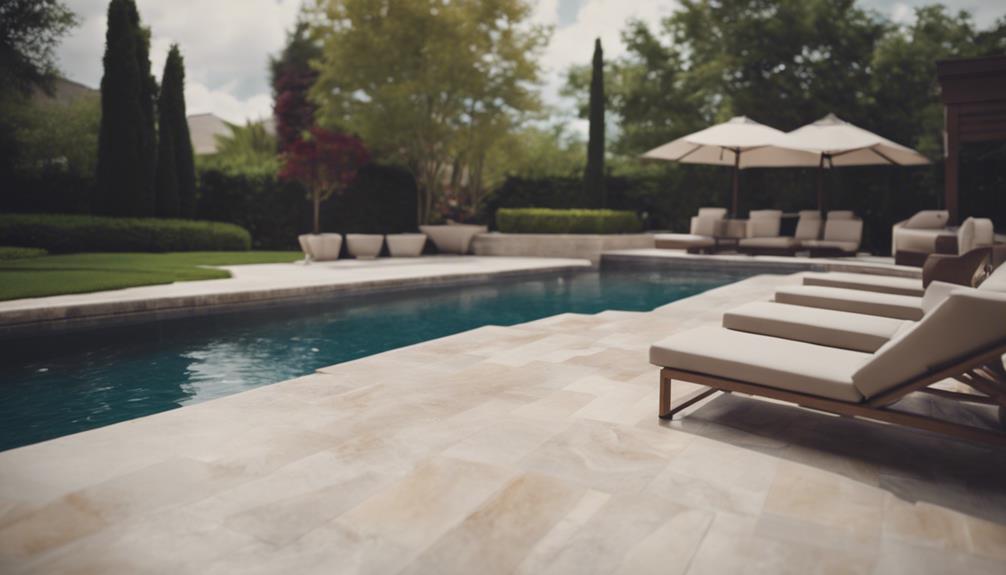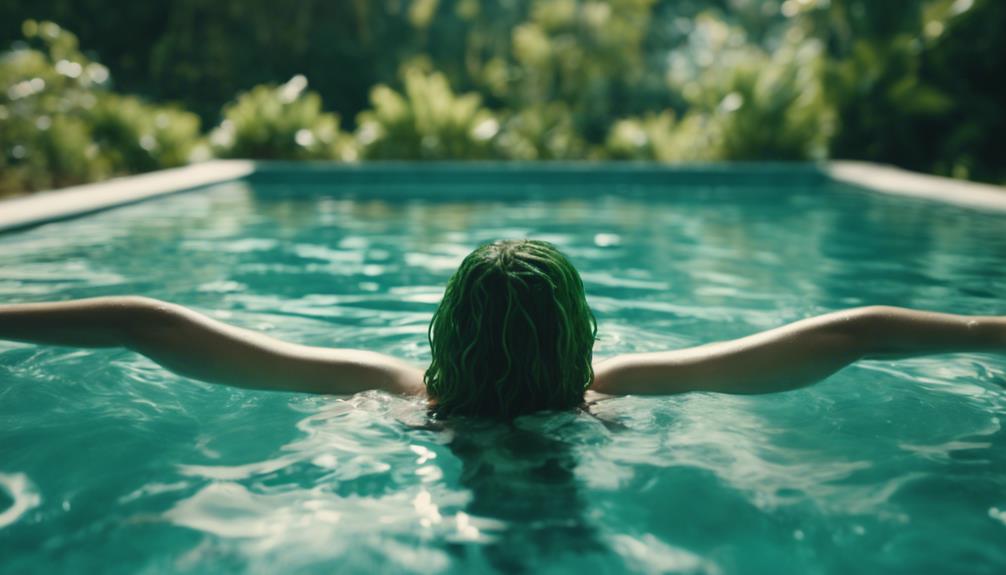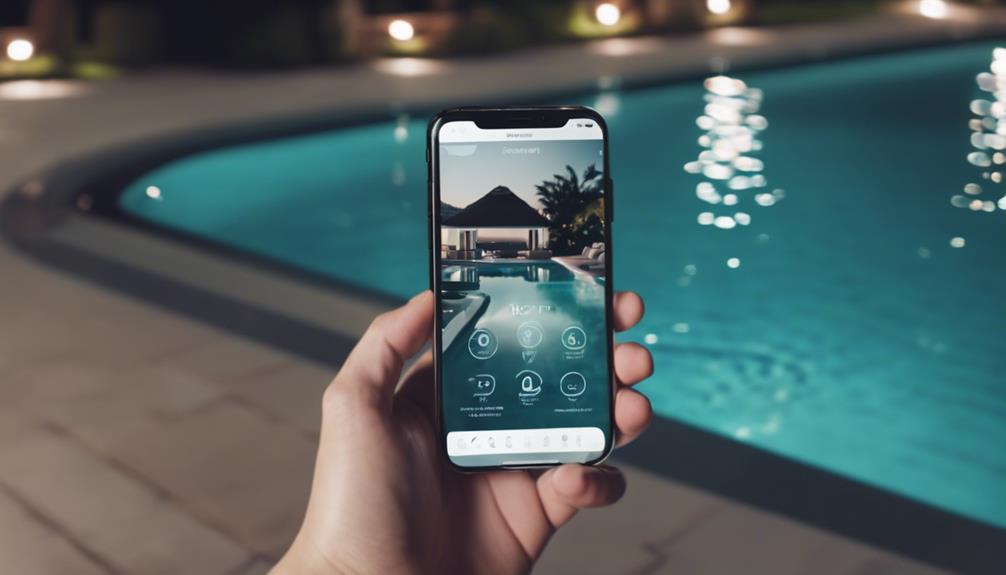Chlorine is essential for pool maintenance, acting as a disinfectant against bacteria and dirt. Maintaining proper levels is fundamental for sanitation and pool size helps determine the right dosage. Forms like powders, granules, and liquids offer unique benefits based on concentration. It's important to keep chlorine levels between 3-5 ppm for effective disinfection and clarity. Safety is paramount in handling chlorine to prevent health risks and accidents. Understanding the basics helps pool owners guarantee a clean and safe swimming environment.
Key Takeaways
- Proper chlorine levels (3-5 ppm) are crucial for pool disinfection and water clarity.
- Different forms of chlorine (powder, granules, liquid) offer unique advantages.
- Regular testing, monitoring pH, and following dosage guidelines are essential.
- Chlorine storage, handling safety, and avoiding chemical mixtures are key precautions.
- Calculating pool size in gallons helps determine the required chlorine quantity.
Chlorine Basics for Pool Maintenance
Understanding the fundamental principles of chlorine application is necessary for effective and efficient pool maintenance. Chlorine plays a vital role in keeping swimming pools clean and safe for use. It acts as a disinfectant, eliminating harmful bacteria and germs, while also oxidizing to remove dirt and other contaminants from the water.
Maintaining the right chlorine levels is critical to guarantee pool water remains sanitary and clear. Typically, swimming pools should contain between 3-5 parts per million (ppm) of chlorine. It is important to calculate the pool's size to determine the appropriate amount of chlorine needed for effective sanitation.
Different Forms of Chlorine
Chlorine is available in various forms, such as powders, granules, and liquids, each serving specific purposes in pool maintenance and water treatment.
Powders, like Calcium Hypochlorite, are useful for shock treatments due to their high chlorine content.
Granules, such as Chlorinated Isocyanurates, are convenient for regular sanitization as they dissolve quickly.
Liquid chlorine, like Sodium Hypochlorite, is effective for daily use and can be added directly to the pool.
Each form has its advantages, from ease of application to concentration levels.
It is essential for pool owners to understand the characteristics of each form of chlorine to determine the most suitable option for their pool maintenance needs.
Importance of Chlorine in Pools

Chlorine plays an essential role in pool maintenance by effectively eliminating harmful bacteria and germs to guarantee a safe swimming environment for pool users. By acting as a potent disinfectant, chlorine not only kills harmful microorganisms but also oxidizes dirt and other foreign materials in the pool water.
Maintaining an appropriate chlorine residual in pools, usually around 3-5 parts per million (ppm), is necessary to ensure ideal disinfection levels. The presence of hypochlorous acid, a derivative of chlorine, aids in the disinfection and oxidation processes within the pool.
Additionally, proper filtration and chlorination help in eliminating pool odors and maintaining water clarity, contributing to an overall enjoyable and safe swimming experience for pool users.
Chlorine Dosage Guidelines
To guarantee effective pool upkeep and proper disinfection levels, pool owners should adhere to recommended chlorine dosage guidelines. It is vital to maintain chlorine levels in swimming pools within the ideal range of 3-5 ppm (parts per million).
The quantity of chlorine needed varies based on the pool's size, which should be calculated in gallons. Chlorine tablets are a popular method of dispensing chlorine, securing a consistent release over time.
Regular testing of chlorine levels, along with monitoring the pool's pH level within the normal range of 7.2-8.0, is important for maintaining a clean and safe swimming environment.
Understanding Chlorine Safety

Ensuring the safe handling and usage of chlorine is paramount for maintaining a secure pool environment. Pool owners must prioritize safety measures to prevent accidents and health risks.
Here are three essential tips for understanding chlorine safety:
- Always store chlorine in a cool, dry place away from direct sunlight and moisture.
- Wear appropriate protective gear such as gloves and goggles when handling chlorine products.
- Never mix chlorine with other chemicals, especially acids, to avoid dangerous chemical reactions.
Frequently Asked Questions
Can I Use Chlorine Tablets in My Above-Ground Pool?
Yes, chlorine tablets are suitable for above-ground pools. Guarantee proper dispersion to maintain adequate chlorine levels for disinfection. Tablets offer convenient and consistent chlorine release. Regular testing and monitoring of chlorine levels are essential for effective pool sanitation and safety.
How Often Should I Shock My Pool With Chlorine?
Shocking your pool with chlorine should be a scheduled event, not a horror story. Typically, shock your pool every 1-2 weeks. Factors like usage, weather, and water quality influence the frequency. Maintain a clear, sparkling oasis.
Is It Safe to Swim in a Pool With High Chlorine Levels?
Swimming in a pool with high chlorine levels is not safe due to potential health risks such as skin and eye irritation, respiratory issues, and even chemical burns. Regularly monitor and maintain proper chlorine levels for a safe swimming experience.
Can I Mix Different Types of Chlorine Products?
Mixing different types of chlorine products can be dangerous as it may lead to chemical reactions and harmful byproducts. State codes mandate understanding and adhering to safe chlorine practices for proper pool maintenance and user safety.
Can I Use Chlorine to Clean My Pool Cover?
Chlorine can be used to clean a pool cover by diluting it in water and applying the solution to the cover. Rinse thoroughly with water after cleaning to remove any residual chlorine. Proper handling and storage of chlorine are essential for safety.
Conclusion
In the dance of pool maintenance, chlorine takes center stage, a vigilant guardian against the murky shadows of contamination. From solid to liquid, its forms vary, yet its purpose remains unwavering – to cleanse, purify, and protect.
Understanding chlorine's potency and potential pitfalls is the secret to revealing the crystal-clear waters of pool serenity. So, let chlorine be your partner in this aquatic waltz, ensuring a harmonious symphony of safety and enjoyment for all who dare to plunge.










